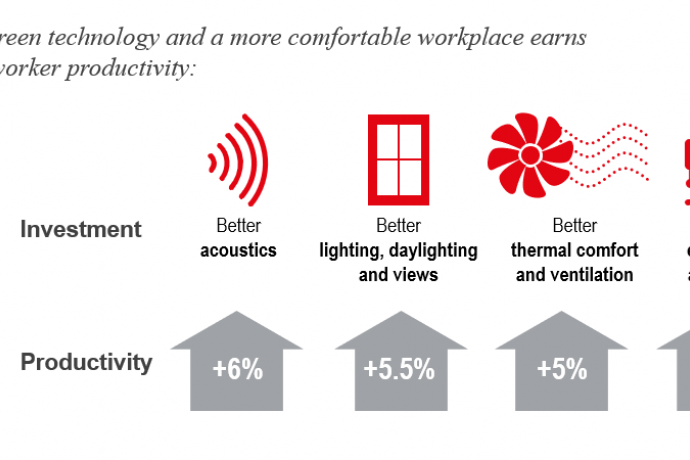Workplace Productivity and Ethics: Building Integrity
Published 02-20-18
Submitted by JLL

By, Cynthia Curtis, Senior Vice President, JLL
Winston Churchill once wisely noted: “We shape our workplaces and thereafter, they shape us.” Some 50 years after his death, his insight has enormous implications for the sustainability field as well as a broader impact on Wall Street itself. In fact, the design and use of commercial office space influence a host of important topics on the sustainability agenda including ethics, employee wellbeing, engagement and worker productivity ~ all legitimate proxies for that elusive brass ring of return on investment.
As one of the largest global commercial real estate companies, JLL has a vested interest in backing up that kind of bold statement. It comes as no surprise to the sophisticated sustainability professional or her colleague in the investor relations department that a successful sustainability strategy rests to a large part on the “built environment.” The often-referenced statistic ~ approximately 40% of global greenhouse gas emissions are produced by buildings ~ is a clarion call for good corporate citizens to attend to their bricks and mortar. Traditionally we have focused on how we can reduce our footprint through more efficient use of energy and conscientious disposal of our waste, and the payback statistics are now irrefutable.
However, a “best in class” approach suggests there is a lot more to be gained when you leverage the workplace as an ally. The way we design, develop and operate the workplace has profound impacts to our handprint: the people side of the sustainability equation.
In a recent research study conducted by JLL, 64% of respondents say that workplace surrounds clearly influence the ethical environment and 81 percent believe that open office plans, which cause staff to be more visible to one another, generally promote improved behaviors when compared to individual office plans. Particularly considering the ongoing revelations about workplace harassment and abuse, JLL’s lessons learned have broad implications to the CSR community.
“When we first really understood the data, we were surprised by the strong correlation between the open floor plan and positive employee conduct,” explained JLL’s Global General Counsel, Mark Ohringer. “Simply put, when people work in an open floor plan, it is more difficult for them to do ‘bad’ things.” Data culled from JLL’s workplace productivity research reveals additional benefits to the triple bottom line attributed to emerging types of office space, including less absenteeism; increased collaboration; lower turnover and higher levels of employee engagement. These more social KPIs are gaining legitimacy among investors who can now link the S in ESG to higher stock price and long-term value-add.
Employee engagement was a focal point of the recent SRI Conference where fund managers consistently spoke to the need for companies to provide fuller disclosure about these types of non-financial metrics that drive value as one way to advance the sustainable responsible investment or SRI approach.
Data from Gallup shows that organizations with an average of 9.3 engaged employees for every one actively disengaged employer experienced 147% higher earnings per share compared to the competition. And according to the consultancy Global Tolerance, almost half of the British workforce now wants to work for an organization that has a positive impact on the world.
Net-net: developing an engaged workforce makes financial sense.
Our bottom line?
JLL is seeing a growing interest by clients in evaluating the socio-economic impact of their buildings and leveraging their workplaces as their ally to deliver bottom line impact. Leading companies in the real estate sector are increasingly able to quantify their positive contributions to social value. Why does it matter? Because more people are seeking purpose at work or demanding that their employers act according to ethical principles. The following comments from our clients say it best.
Comments from clients with open workspaces:
“Employees are more aware of openness and sharing in the office and are less likely to commit ethics violations as a result.”
“Having open office space clearly makes it more difficult for someone to commit unethical acts (like sexual harassment or inappropriate internet use) …We simply no longer get these kinds of complaints about people in open office configurations.”


